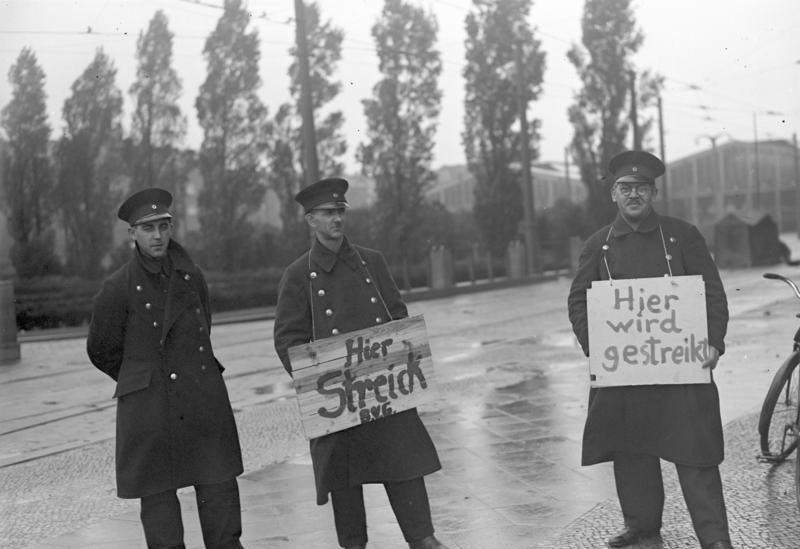1932 Berlin transport strike on:
[Wikipedia]
[Google]
[Amazon]
 The 1932 Berlin transport strike was an industrial labor dispute in
The 1932 Berlin transport strike was an industrial labor dispute in
German Historical Museum. Retrieved August 11, 2011
 The 1932 Berlin transport strike was an industrial labor dispute in
The 1932 Berlin transport strike was an industrial labor dispute in Berlin
Berlin ( , ) is the capital and List of cities in Germany by population, largest city of Germany by both area and population. Its 3.7 million inhabitants make it the European Union's List of cities in the European Union by population within ci ...
, during the Weimar Republic
The Weimar Republic (german: link=no, Weimarer Republik ), officially named the German Reich, was the government of Germany from 1918 to 1933, during which it was a constitutional federal republic for the first time in history; hence it is ...
period of interwar Germany
Germany,, officially the Federal Republic of Germany, is a country in Central Europe. It is the second most populous country in Europe after Russia, and the most populous member state of the European Union. Germany is situated betwe ...
.
History
The employers, the Berliner Verkehrsgesellschaft (BVG), were responsible for public transport in Berlin. It was one of the most significant strikes in the last days of the Weimar Republic. The strike began on 3 November. It was solid apart from one or two token trams run by management which hardly any passengers boarded. On 4 November the strike was declared illegal and armed police were placed on the few trams which made "demonstrative trips". The strikers blocked depots, ripped up track and fought with the police. There were over 500 arrests and four people were killed by the police. The strike ended on Monday 7 November, the day after the elections. It was organised principally by the ''Revolutionäre Gewerkschafts Opposition The Revolutionäre Gewerkschafts Opposition (Revolutionary Union Opposition) was the Communist union in Germany during the Weimar Republic.Larry Dean Peterson''German Communism, Workers' Protest, and Labor Unions: the Politics of the United Front in ...
or RGO (Revolutionary Trade Union Opposition), a union which had been founded by the Communist Party of Germany following their adoption of the concept of the Third Period
The Third Period is an ideological concept adopted by the Communist International (Comintern) at its Sixth World Congress, held in Moscow in the summer of 1928. It set policy until reversed when the Nazis took over Germany in 1933.
The Comint ...
, by which Social Democracy
Social democracy is a political, social, and economic philosophy within socialism that supports political and economic democracy. As a policy regime, it is described by academics as advocating economic and social interventions to promote s ...
was castigated as social fascism
Social fascism (also socio-fascism) was a theory that was supported by the Communist International (Comintern) and affiliated communist parties in the early 1930s that held that social democracy was a variant of fascism because it stood in the way ...
. The strike was also supported by the Nazi labor union National Socialist Factory Cell Organization
The National Socialist Factory Cell Organization (german: Nationalsozialistische Betriebszellenorganisation, NSBO or NSBZO) was a workers organization in Nazi Germany.
In 1927, some NSDAP workers in large factories, located mostly in the Berlin ...
.''"Die Revolutionäre Gewerkschaftsopposition"''German Historical Museum. Retrieved August 11, 2011
See also
* *References
Berlin 1932 Transport strike 1932 Berlin transport strike Berlin transport strike 1932 Strike 1932 Berlin transport strike 1932 labor disputes and strikes {{Germany-hist-stub